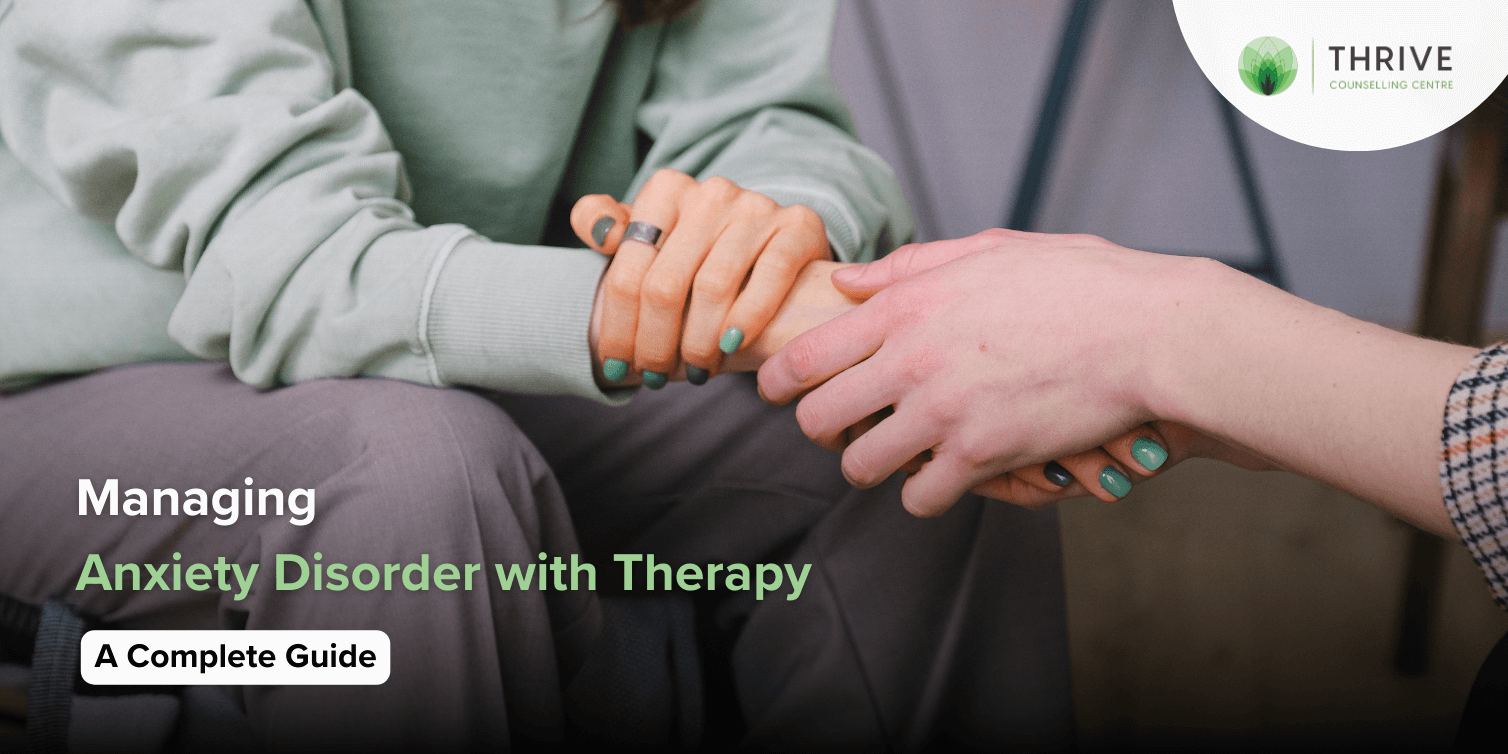How a licensed therapist for anxiety can help you overcome daily stress
How a licensed therapist for anxiety can help you overcome daily stress
Blog Article
Exploring Different Methods in Coaching for Anxiety Condition for Long-term Change
When tackling anxiety conditions, it's necessary to discover a range of counseling techniques. Each approach offers special understandings and tools to help you manage your signs properly. You might discover that combining methods can yield the ideal results. However, understanding the nuances of these approaches is crucial to promoting lasting adjustment. What happens if the ideal mix could release a new level of emotional well-being for you?
Comprehending Stress And Anxiety Conditions: A Short Overview
Stress and anxiety conditions, which impact millions of individuals worldwide, can substantially influence day-to-day life. You may experience frustrating feelings of concern or worry that seem irrepressible. These sensations can cause physical symptoms like a racing heart, sweating, or perhaps dizziness. Common sorts of anxiety conditions consist of generalised stress and anxiety condition, panic problem, and social anxiousness disorder. Each has distinct signs, however they all share a propensity to disrupt your routine and relationships.Understanding the source of your anxiety is crucial. It could originate from genetics, brain chemistry, or life experiences. Recognizing your triggers can aid you handle your responses better. It's crucial to bear in mind that you're not alone in this battle. Lots of people encounter comparable difficulties, and looking for aid is a solid step towards feeling better. By finding out regarding anxiousness problems, you're currently on the course to understanding and managing your problem better.
Cognitive-Behavioral Treatment: Testing Negative Thought Patterns

Determining Negative Thought Triggers
When you run into minutes of distress, recognizing the certain triggers behind your negative ideas can be essential in handling anxiety. Beginning by focusing on circumstances that prompt feelings of worry or worry. Is it a jampacked area, a future due date, or a conversation with certain individuals? Jot down these circumstances in a journal. This will aid you identify patterns in your thinking. Likewise, notice physical experiences that accompany your unfavorable ideas, like an auto racing heart or tightness in your chest. By pinpointing these triggers, you get insight into what's sustaining your anxiousness. Comprehending these links is the initial step in challenging those thoughts and ultimately gaining back control over your emotional actions.

Replacing Ideas With Positives
Challenging negative idea patterns is a necessary action in changing your way of thinking and reducing stress and anxiety. You might commonly discover on your own entraped in cycles of insecurity or devastating thinking. Instead of letting these thoughts determine your feelings, practice changing them with sensible choices or positive affirmations. When you believe, "I can not handle this," move it to, "I can manage obstacles one step at a time." This easy adjustment can substantially affect your emotion. Routinely determining and countering these adverse ideas helps create a healthier internal dialogue. Keep in mind, it takes time and initiative, yet constantly exercising this strategy can cause lasting adjustment, empowering you to encounter stress and anxiety with renewed self-confidence and resilience
Structure Coping Methods With Each Other
Changing adverse thoughts is just the start of taking care of anxiousness effectively. To create long lasting change, you require to build coping approaches that equip you. Cognitive-Behavioral Treatment (CBT) assists you identify and challenge those purposeless thought patterns. Together, you and your therapist can discover how these thoughts impact your sensations and behaviors.Start by establishing functional strategies, like journaling or mindfulness workouts, that enable you to challenge anxiousness head-on. When you encounter your fears progressively, you'll find out to react in different ways.

Mindfulness and Acceptance-Based Approaches: Growing Present-Moment Understanding
As you browse the intricacies of anxiousness, including mindfulness and acceptance-based approaches can significantly boost your capability to cultivate present-moment awareness. By concentrating on the below and now, you'll find that you can observe your ideas and feelings without judgment. This practice assists you recognize your anxiety without really feeling overwhelmed by it.Engaging in mindfulness exercises, such as deep breathing, body scans, or directed reflections, permits you to ground yourself in your existing experience. Acceptance-based methods encourage you to accept your feelings instead of fight versus them. They lose their power over you.Incorporating these methods into your daily regimen can change exactly how you respond to anxiousness when you accept your feelings. You'll create strength and find out to navigate demanding scenarios with higher ease. Inevitably, cultivating present-moment recognition lays the foundation for long-term change, empowering you to lead an extra satisfying life.
Exposure Treatment: Confronting Worries Gradually
Exposure therapy aids you confront your worries in a gradual method, making it much less overwhelming. You'll find out strategies to encounter anxiety-provoking situations step by step, while additionally developing coping strategies to manage your responses. This technique encourages you to take control and decrease anxiousness with time.
Gradual Direct Exposure Strategies
When encountering anxiety, gradually challenging your anxieties can be a powerful means to gain back control. This method, understood as steady exposure, includes slowly subjecting yourself to the circumstances or things that trigger your anxiety. Start with less intimidating scenarios and progressively function your method approximately even more challenging ones. If you're terrified of public speaking, you might begin by talking in front of a mirror, after that progress to sharing thoughts with a friend, and at some point deal with a tiny team. Each step helps desensitize you to the anxiety, developing your self-confidence in time. Keep in mind, it's vital to pace on your own and celebrate small victories as you relocate via this procedure, reinforcing your ability to manage anxiety successfully.
Structure Coping Strategies
Structure reliable coping approaches is important for handling stress and anxiety, specifically as you challenge your fears gradually. One effective technique is direct exposure treatment, where you begin by facing your worries in a regulated manner. Begin with less daunting circumstances and slowly work your way up to more difficult circumstances. This gradual exposure helps desensitize you to stress and anxiety activates, making them much less overwhelming.Incorporate leisure methods, such as deep breathing or mindfulness, to relax your mind throughout exposure. Track your progress, celebrating little victories along the means to improve your confidence. Bear in mind, it's all right to take your time; the goal isn't perfection yet constant click here improvement. By developing these methods, you'll encourage yourself to navigate stress and anxiety and embrace life much more totally.
Psychodynamic Therapy: Uncovering Source of Anxiety
Psychodynamic therapy discovers the subconscious mind, disclosing the origin of your anxiety - Counseling services for anxiety. By analyzing your ideas, feelings, and past experiences, this method helps you uncover underlying problems and unsolved issues that might contribute to your existing anxiousness. You'll function with a therapist to explore youth experiences, connections, and emotional patterns that form your actions today.As you gain understanding right into these deeper layers of your mind, you'll start to acknowledge how past occasions influence your existing habits. This understanding can cause catharsis, allowing you to process emotions you may have suppressed.Through the healing relationship, you can additionally identify defense reaction that might have developed over time, supplying a clearer course to change. Ultimately, psychodynamic therapy outfits you with the devices to resolve your anxiety at its core, advertising long lasting makeover in your psychological health
Integrative and Holistic Techniques: Integrating Techniques for Greater Efficiency
Incorporating various healing techniques can enhance your trip towards managing anxiety better. By integrating aspects from cognitive-behavioral treatment, mindfulness techniques, and alternative approaches, you can produce a personalized method that addresses your unique demands. As an example, you might make use of cognitive-behavioral techniques to challenge unfavorable idea patterns while incorporating mindfulness exercises to ground yourself in the here and now moment.Additionally, checking out holistic techniques such as yoga or meditation can advertise leisure and decrease anxiousness symptoms. This blend enables you to develop greater self-awareness and resilience.Experimenting with these varied methods can assist you uncover what reverberates most with you. Keep in mind, it has to do with discovering a harmony that functions, instead of adhering to a solitary approach. This integrative technique not only supplies prompt relief yet additionally fosters long-lasting abilities for handling anxiety, encouraging you to redeem control over your life.
The Function of Assistance Systems: Building Resilience With Connection
While it might appear that handling stress and anxiety is a singular journey, having a solid assistance system can play a vital duty in your strength. Bordering on your own with empathetic good friends, family, or support system develops a safe area where you can openly share your experiences and sensations. When you get in touch with others, you advise yourself that you're not the only one in this struggle.These relationships provide encouragement and can provide functional coping approaches that have actually helped others. It's additionally an opportunity to gain viewpoint; close friends can help you see scenarios in a different way, lowering feelings of isolation.Moreover, emotional assistance promotes a sense of belonging, which can greatly relieve anxiousness symptoms. By leaning on your support group, you can build strength and take on difficulties extra efficiently. Bear in mind, reaching out for aid suggests strength, and it can make all the distinction in your journey towards managing anxiety.
Frequently Asked Questions
What Are the Usual Signs of Anxiousness Conditions?
You could experience uneasyness, tiredness, trouble focusing, irritation, muscular tissue stress, and sleep disruptions. Physical signs and symptoms can include fast heart beat, sweating, and shivering. Identifying these indicators early can help you seek appropriate assistance and treatment.

How Much Time Does Treatment Commonly Last for Anxiety Conditions?
Therapy for anxiousness conditions typically lasts anywhere from a few weeks to a number of months. It truly depends upon your specific requirements, development, and the techniques your therapist uses to help you manage your stress and anxiety successfully.
Can Medication Be Used Along With Treatment for Stress and anxiety?
Yes, medicine can most definitely be made use of along with therapy for stress and anxiety. Incorporating both approaches frequently improves therapy effectiveness, assisting you handle signs and symptoms while exploring underlying concerns through counseling. Always consult your doctor for personalized guidance.
Exist Self-Help Strategies for Handling Stress And Anxiety?
Yes, there are a number of self-help techniques for taking care of stress and anxiety. You can practice mindfulness, participate in routine workout, preserve a balanced diet, establish a routine, and make use of deep breathing techniques to help in reducing anxiety symptoms properly.
Exactly how Do I Know if I Need Professional Assistance for Anxiety?
You ought to think about seeking professional help for anxiousness if it interrupts day-to-day live, causes substantial distress, or if self-help approaches aren't functioning. Depend on your reactions; connecting can lead to far better coping skills and support. Common types of anxiousness problems consist of generalised anxiousness disorder, panic disorder, and social anxiety disorder. When you encounter minutes of distress, acknowledging the certain triggers behind your negative ideas can be vital in managing anxiety. Changing negative ideas is just the start of managing stress and anxiety successfully. By examining your ideas, feelings, and past experiences, this approach aids you discover underlying problems and unsettled issues that may contribute to your present anxiousness. It's additionally an opportunity to obtain point of view; friends can assist you see situations in different ways, minimizing feelings of isolation (Counseling services for anxiety).Moreover, emotional support fosters a feeling of belonging, which can greatly reduce anxiousness signs
Report this page